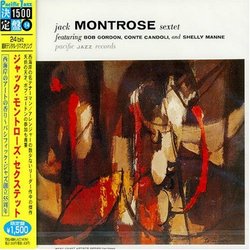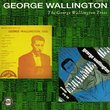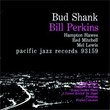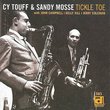| All Artists: Jack Montrose Title: Jack Monterose Sextet (24bt) Members Wishing: 0 Total Copies: 0 Label: Toshiba EMI Japan Original Release Date: 1/1/2007 Re-Release Date: 6/4/2007 Album Type: Import, Original recording remastered Genres: Jazz, Pop Style: Cool Jazz Number of Discs: 1 SwapaCD Credits: 1 |
Search - Jack Montrose :: Jack Monterose Sextet (24bt)
 | Jack Montrose Jack Monterose Sextet (24bt) Genres: Jazz, Pop
|
Larger Image |
CD DetailsSimilar CDs
|
CD ReviewsSearch it all over the globe and good luck Jazzcat | Genoa, Italy Italy | 08/26/2004 (5 out of 5 stars) "I have been lucky enough to find this gem in a used records shop. I don't think it could be a common event. How many available copies of this one could be out there waiting for a new owner? Very few I guess because very few could be the people who gave away this treasure. Moreover the reissue has been made in 1998 in an extremely limited edition release. So if you are lucky enough to find this one buy it immediatly. It is a wonderful album which comprehend two different sessions (sextet and quintet) leaded by Montrose (tenor sax and arranger) made in 1954/1955. Some of the guys involved: Shelly Manne, Bob Gordon, Conte Candoli, Paul Moer, Joe Mondragon ... got it? The music is stellar west coast jazz of the highest caliber with a rare freshness. It is reinvigorating, it swings like mad and the joy of playing is all around the album. There are also contrapuntual moments and arranging visionary ideas. West Coast Jazz "Creme de la creme" for true connossoirs. Believe. Go, run, what are you waiting for? Go, search this one all over the place!" Montrose & Gordon=Great mainstream-modern jazz Bomojaz | South Central PA, USA | 10/22/2005 (5 out of 5 stars) "Jack Montrose was born in Detroit but headed west and became a mainstay in the West Coast arena of modern jazz players. This CD collects two Pacific Jazz albums, one under his leadership, the other under baritone saxman Bob Gordon's. They date from 1954-55. Both albums offer up excellent examples of what was going down on the West Coast scene at this time. Montrose has expressed a particular liking for Zoot Sims, but his playing leans more towards Sonny Rollins: spare, rather cool (little vibrato), with an intellectual approach rather than an emotional one. Montrose was proud of his arranging abilities, which can be found here in intricately designed intros to many of the tunes (sometimes TOO intricate). But the music swings. The Bob Gordon album is a tad better. MEET MR. GORDON is an excellent medium tempo blues. TWO CAN PLAY is another highlight. Gordon was an excellent bari sax player who died much too young in a car crash. It's nice having these two rare Pacific Jazz LPs back in circulation again on this CD. Definitely worth checking out." Another Very Rare ,"Perfect" Albums. P. Simms | Williamsburg, VA | 05/07/2006 (5 out of 5 stars) "I inherited the original vinyl from my mentor and drum teacher, himself a big fan of Shelly and the others on this album. A respected jazz musician, himself, he was also an opponent of the bickering of the 1950's. He taught us that jazz came from no coast, and no ethnicity, but purely from the heart and out of one's horn. This is a perfect example of an album that was so outstanding, yet unfortunately came along at a time when prima donna jazz celebrities attacked others for their perceived geography, for copying their style or even their ehtnicity. But, having been a professional musician for a long time, I learned a truism, long ago, that applied as much then as today..."If it smells...It sells!" This petty bickering was made all the worse, at the time, by many critics. It's often said that, "Those who can, do...while those who can't, teach." But at least those who teach know how it's done, in academia. Looking back, at a long list of jazz reviews I recently had access to, of musicians and albums from the time of the Jack Montrose Sextet, I realized that many of the critics of the day were an even lower form of life than I had imagined. I don't think I read hardly any critic's reviews that were by people who could play at all, let alone had any chops. They were as catty and petty as the reports in the current celebrity tabloids of 2006. No wonder it's mostly other musicians who remember and revere their bretheren, such as Jack Montrose, Bob Gordon, and the other members of this group. How did one get to be a professional jazz critic in the 1950's? I guess it started with being tone deaf, or maybe even just deaf.
As I said in my reviews of Shelly Manne & His Men Vols.4 and 5, the Jack Montrose Sextet is likewise a blend of perfects: composition, arrangement, musical interpretation, performance, and incredible improvized solos. There's always some tone deaf curmudgeon who finds such complex compositions and arrangements, "excessive," Jack's tone not to their liking, or the solos too "cerebral". Well, excuuuse me! I'm sorry the progressions unfairly challenged your ear, with more than three basic blues chords. I'm sorry the arrangements make innovative and thought provoking restatements of the musical themes. And I'm sorry that the soloists actually construct melodies, rather than go into histrionic noodling and pyrotechnics. It often sounded to me that this was done in hope of getting lucky, of hitting a decent lick, now and then, and that it might be enough to fool the listener into not realizing the soloist was sort of...lost, and couldn't quite find the progression in their head. Trumpet players seem to me, to have always been the worst offenders of this, often straying painfully far afoot of the chord progression. It wasn't until I heard the finer melodists, such as Stu Williamson, Chet Baker, Shorty Rogers, and their equal on this album, Conte Condoli, that I realized that the trumpet could play as melodically and structured as a sax, flute or piano. As a child I listened to a lot of "popular" jazz, but remember, "If it smells, it sells!" I had to wait to listen to the finely structured solos of Stu and Conte, Bob & Jack, Bud & Art, and piano melodists like Russ Freeman, Jimmy Rowles and Hampton Hawes, before I had any concept of the musical rules of improvisation within and around a progression. I was just a child, and had to figure out on my own, that a tune's melody, themes and chords, provide the colors, as on an artist's palette. They are the tools with which to create the melodies and ideas of a perfect solo, played back within those progressions and melodies. All of the solos on this album are innovative and inspired. Yet there are no clunkers, no bad notes, and no noodling in search of some way out of a dead end. Well structured, here, is not a criticism. Far from sterile, these solos all stand up and wail! Typical of Jack Montrose, the arrangements have delights at every turn in the road, with introductions that are a not only musically captivating, but perfect lessons in one of the most important tenets of all music...theme, variation and developement. As in a Bach fugue, Jack could milk a theme until the udder was dry, and you still want to come back for more. Learning every note, when I first heard it, in the 8th grade, I couldn't get over how the introductions were almost like separate works in themselves. A virtual text book on arranging, it is constantly punctuated with contrasts, both sharp and mild, such as harsh dissonances suddenly melding into almost saccharin-sweet resolution...just beautiful music. An exceptionally well recorded & engineered album, even by today's standards, the presence and tonality of the voices is equally well selected and blended. Conte's sharp trumpet is perfectly complemented by Jack's often glassy smooth tone on tenor, all balanced out by Bob's unusually fat, reedy tone on baritone. And all the while the rhythm section adds its perfect punctuation. Are there any one or two selections that particularly stand out? Not to me...they are equal. The best you can hope for is pointing out individual highlights. The opener, "Listen Hear", goes from a rather gentle piano intro into a tonally challenging fugue that is still going on a minute and a half later, when the solos begin. Talk about theme, variations and developement, it doesn't get any better than this. My mentor's favorite of the album was "Some Good Fun Blues", a crazy three within four, but with Jack's typical intro and developement. Particularly outstanding is the section at the end for Shelly's solo exchanges with the band. I learned every note of it before ninth grade Maybe my personal favorite moment on the whole album is Bob's baritone solo on "Fools Rush In". Starting from Jack's rollicking intro for him, he comes on like he was shot out of cannon. His improvisation is furioiusly intense, yet he is still in such control, that one of his first phrases catches his eye, and gets restated several times in a row, from every angle, until he moves on. He and Conte were both masters of such control, on this recording, even at blinding speeds, that they could grab a passing lick, develope it from numerous angles and move on as cleanly as if it were all written out and rehearsed. Another factor showing the wonderful synergy between these six is how they often start their solos, picking up from the last notes of the previous solo, once again, as if they rehearsed it. At the end of the trumpet solo on "Some Good Fun Blues", Jack comes in as if picking up from Conte's previous phrase, and continuing the musical developement. Even better is Paul Moer's piano on "Fools Rush In". He picks up the tail end of Conte's notes as if to take the idea, and do a little devlopement of it on his own. This synergy is heard throughout the album. If you are a Shelly Manne fan, this is another candidate for his best work. It seems his extended chromatic solo on "Un Poco Loco", (Shelly Manne & His Men Vol.4)is often cited as his best, though his playing on Bill Holman's "Quartet", on Vol. 5, is every bit its equal, to other fans. His collective work on this Jack Montrose Sextet album, should be raised and put upon that same plinth of honor. If what you like is music without melody, pyrotechnics without discipline, arrangements no more complex than a pointed stick, and solos without honor...then don't buy this album. " |

 Track Listings (8) - Disc #1
Track Listings (8) - Disc #1


